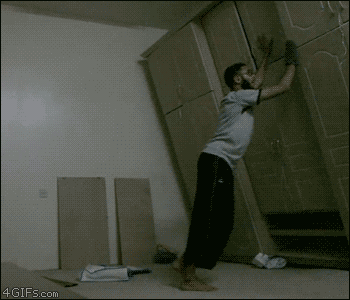 You may remember the old Roadrunner cartoons where Wile E. Coyote, distracted by his mad pursuit of his prey, runs right off the edge of a cliff before pausing in mid-air. Oddly, he’s fine as long as he doesn’t look down and notice the reality of his situation. If he’d just kept running, he might have made it to the other side of the gap (where his nemesis had already paused to “Beep! Beep!” at him before speeding away).
You may remember the old Roadrunner cartoons where Wile E. Coyote, distracted by his mad pursuit of his prey, runs right off the edge of a cliff before pausing in mid-air. Oddly, he’s fine as long as he doesn’t look down and notice the reality of his situation. If he’d just kept running, he might have made it to the other side of the gap (where his nemesis had already paused to “Beep! Beep!” at him before speeding away).
Eventually, however, he does look down. He takes a moment to emote defeat or despair, sometimes even waving to us or holding up a cute little sign offering concise commentary on his plight. Then… he plummets to the ground far below, reappearing after the commercial to begin his next futile effort to catch that $#%&* bird.
Imagine, however, if Wile simply accepted the reality of his situation before running off the cliff. What if he looked at his track record, and that of the Road Runner, and realized that statistically he was probably never going to catch the thing and that his time would be better spent doing something else. Would that be… victory? Would that mean he’s growing, learning, and adjusting to circumstances? Or would such a shift in thinking mean he’d lost something valuable in the pursuit?
We mock him, but who do we relate to more in those cartoons – the antagonistic bird or the eternally determined coyote?
Education certainly isn’t the only field in which we sometimes have to keep running and ignore the fact that we long ago left the cliff. Many professions contain some element of blind faith and a daily decision to embrace the long-term possibilities, whatever today may hold. There are times we catch glimpses of the harvest – students who evolve so dramatically over time, notes received from those impacted in the past, or conversations in which light bulbs pop up over the most unexpected heads. Sometimes we catch the Roadrunner, if only for a moment. Make note of those moments – file them away in tangible form so you can prove to yourself they happened when you need to.
Seriously, you’d be surprised.
Altar-ing Course
If you’re a Sunday-Go-To-Meetin’ person, you may recall that in the Old Testament, it was common after the Lord God did something noteworthy for those impacted to build an alter commemorating the moment. It probably seemed a bit odd to some. Were they really worried they’d “forget” that time Jehovah destroyed thousands of their enemies with fire, disease, or sporks? Was there genuine danger after El-Shaddai wrestled with you all night, changed your name, and altered the course of your descendants for a thousand generations that it might slip your mind down the road unless you left a pile of rocks nearby?
Yes. Yes, there was. That’s why it was useful to build a display commemorating the moment and maybe even write down what happened. That’s why so many major events began with leaders recounting everything important that had happened up until that point before announcing plans going forward. We are a shallow, short-term people – and not just spiritually. Circumstances change. It may not seem like it while you’re on the mountain, but you’ll at some point likely hit a valley or two. (Things seem even less changeable when you’re in the valleys, but chances are good you’ll eventually glimpse sunlight again.) And guess what makes all of this easier to remember?
Obviously it doesn’t have to be a literal altar. A folder or storage bin under the bed will do just as well. The point is, sometimes you have to look back and remember when things were better in order to help you believe they won’t always be like they feel now.
The rest you have to fill in with a little healthy self-delusion.
The Challenges Of Selective Reality
We’ve seen some pretty extreme reminders in the past year of what happens when people aggressively deny fundamental reality and replace it with their own fan-favorite nonsense. Educators can’t ethically afford to completely ignore the signs that something’s not working. I’m positive any teacher reading this could easily list a half-dozen things they’d change if they had the power which would dramatically improve both students’ experiences and overall academic performance. It’s harder to be truly reflective and think critically about what you could be doing differently, however – especially if you’re in a situation where you feel so little support to begin with.
It’s an irony I suspect occurs in other professions as well. When you’re supported, listened to, and valued, it’s easier to question what you’re doing and challenge yourself to get better. When you’re constantly belittled and discouraged, there’s little room for that sort of risk. You hunker down and do your best to just “get through.” Check the boxes. Do the minimum. No one cares anyway. It’s not like the students are going to notice or get all worked up that you’re not “challenging them” enough. Just do the paperwork. Log in to the training, turn off your camera, and watch Netflix on your phone. Keep grades current, update Canvas regularly, and beyond that, to hell with it.
That’s when you most need some positive self-delusion. That’s when you should absolutely sacrifice a little reality for some belief. Stop looking down. I don’t care how far it is. Look forward and focus on the raspberry that bird is blowing at you as we speak. Then run.
Choosing Your Delusions
Yes, we have to keep slapping ourselves a bit to make sure we’re not becoming “that” teacher. We have to find ways to think critically and professionally about what is and isn’t working. We have to distinguish their hoops from our hopes (I can’t believe I just said that). If you’re not getting better, you’re usually getting bitter (dear golly, that’s two in a row).
That said, I respectfully suggest our self-evaluation should be focused on reaching the cliff on the other side of the gap – NOT on looking down to think too much about where we are right this moment. I hesitate to come right out and say it, but I think sometimes surviving in the world of education requires a sort of selective self-delusion. We gotta try to be honest with ourselves about ourselves, but I’m not sure I want to look too closely at the realities around me. I’m not sure I want to know what the chances are that anything I’m doing will make a noticeable difference for most of the kids in front of me. I’m not sure I want to think too much about the relative impact I’m likely to have compared to peer groups, cultural pressures, social media, poverty, and race. I’m positive I don’t want to get bogged down in my shortcomings and failures over this bizarro pandemic teaching clusterfunk – all the things I’d try differently if we could go back and try again.
Not that I’d ever willingly go back and do this again.
How can we tell the difference between our “delusions” and those of right-wing ideologues, demagogues, conspiracy theorists and propaganda machines? I think it comes down to something cheesy. Something I’m almost embarrassed to type, but can’t express any other way.
I choose the kinds of delusions that make me more hopeful. I choose the delusions that give me more faith in my kids than they’re sometimes justify in the short-term with their choices. I choose the delusion that the opposing cliff is closer than it seems and that it’s more possible than it looks to make a positive difference in the lives of those in my care. These delusions may not have the natural traction of “those who oppose me draw their power from the plasma of sex-trafficked children and Pizza Hut is their mosque” or “Jesus wants me to stand up for my rights and stop being forced to consider the health and welfare of other people,” but I’d argue the tone is noticeably different.
I distinguish between delusions based on the attitude and goal driving them. That may not make one type truer than the other, but it certainly makes some more palatable than others – and that’s what I’m choosing to go with.
Strap On Your ACME Helmet
If there are things you could do better next year, by all means – dig in and fix them. If there are lessons you’ve learned from this past year (or four), then get serious about learning them and make the necessary adjustments so you don’t have to learn them again.
But don’t look too closely at the short-term results or the apparent reality of your situation – not if you want to keep going until you reach the other side (at least temporarily). Don’t count the number of times the Road Runner has escaped or discount your latest rocket-shoes, catapult, or magic hole-on-a-wall before you’ve tried them with full conviction. You’re probably not going to accomplish all you hoped when you took on this gig. You’re probably not going to have movies made about you or books written about your impact. I wouldn’t even bet on a “Mr. Holland’s Opus” moment now or in the future.
That doesn’t mean you’re not doing a good job. It doesn’t prove your worst fears and adds zero credibility to the accusations of your detractors. All it means is that sometimes you can’t see it and probably shouldn’t think too hard about it. Not this time. Maybe eventually, but not right now. For now, having the right sort of delusions is enough.

 I’m not sure I want my students to succeed.
I’m not sure I want my students to succeed. Well, my #11FF, I decided to record a few podcasts for new (or reviving) educators. This seems like a wonderful idea because I lack the proper equipment, there are dozens of excellent education podcasts out there already, I have nothing to sell, and this year is so weird it’s hard to know how to prepare for it anyway.
Well, my #11FF, I decided to record a few podcasts for new (or reviving) educators. This seems like a wonderful idea because I lack the proper equipment, there are dozens of excellent education podcasts out there already, I have nothing to sell, and this year is so weird it’s hard to know how to prepare for it anyway.
 See, we were on a 12-foot stage for the first time, giving me around 8 feet of strutting space to work with. It was wonderful after months of squeezing in behind Asteroids machines and pool tables, and we made full use of it in those opening moments – myself, my guitar… and the 6-foot cord connecting it to my amp.
See, we were on a 12-foot stage for the first time, giving me around 8 feet of strutting space to work with. It was wonderful after months of squeezing in behind Asteroids machines and pool tables, and we made full use of it in those opening moments – myself, my guitar… and the 6-foot cord connecting it to my amp. This was a Pre-AP class, full of high school freshmen with large vocabularies and enough creativity to provide their own inappropriate responses to that one. It took a few minutes to reign it all in, during which I was wondering quite sincerely whether or not I was likely to be fired that very day.
This was a Pre-AP class, full of high school freshmen with large vocabularies and enough creativity to provide their own inappropriate responses to that one. It took a few minutes to reign it all in, during which I was wondering quite sincerely whether or not I was likely to be fired that very day. It’s a teacher thing, to be sure, but it’s also a parent thing… and a spouse thing… and a writer thing… and a salesman thing… and a pro-wrestler thing… and a mid-level management in charge of human resources and development but also the only one who ever brings donuts or cleans the coffee machine thing… and probably lots of other things as well.
It’s a teacher thing, to be sure, but it’s also a parent thing… and a spouse thing… and a writer thing… and a salesman thing… and a pro-wrestler thing… and a mid-level management in charge of human resources and development but also the only one who ever brings donuts or cleans the coffee machine thing… and probably lots of other things as well.
 The rest of us aren’t merely relieved to be wrapping up the first half of the school year, but a bit surprised to have survived it at all. You may be wondering if this was really your best choice of schools, or states, or whether or not you’re even in the right profession. You may feel like you haven’t done enough for your students, or – worse – that you’ve done everything you could and it just… didn’t work.
The rest of us aren’t merely relieved to be wrapping up the first half of the school year, but a bit surprised to have survived it at all. You may be wondering if this was really your best choice of schools, or states, or whether or not you’re even in the right profession. You may feel like you haven’t done enough for your students, or – worse – that you’ve done everything you could and it just… didn’t work. Adrian can’t read, Garrett has anger issues, and Anaiyah won’t turn in assignments no matter how often you beg. Yes, you are the adult in the room who must figure out ways to address these issues. Yes, you are the educator who has taken responsibility for solving these problems as best you can. But you didn’t cause them. They are not your failure. They are not proof of anything about you, other than your willingness to keep trying.
Adrian can’t read, Garrett has anger issues, and Anaiyah won’t turn in assignments no matter how often you beg. Yes, you are the adult in the room who must figure out ways to address these issues. Yes, you are the educator who has taken responsibility for solving these problems as best you can. But you didn’t cause them. They are not your failure. They are not proof of anything about you, other than your willingness to keep trying. Do what you gotta do to keep your gig or score that merit pay, but don’t take evals to heart if – after a reasonable period of reflection – you decide they’re neither accurate nor useful.
Do what you gotta do to keep your gig or score that merit pay, but don’t take evals to heart if – after a reasonable period of reflection – you decide they’re neither accurate nor useful. We rarely see the long-term impact of our efforts in this business. Occasionally you’ll have a kid write something thoughtful in a card or say something at that sticks with you. From time to time, they’ll come back and visit or reach out on social media.
We rarely see the long-term impact of our efforts in this business. Occasionally you’ll have a kid write something thoughtful in a card or say something at that sticks with you. From time to time, they’ll come back and visit or reach out on social media. I don’t even mind some of the self-doubt and desperation to be better, to do more, to somehow make it all work. It may not be entirely healthy, but if it drives you forward and keeps you introspective – and that’s something.
I don’t even mind some of the self-doubt and desperation to be better, to do more, to somehow make it all work. It may not be entirely healthy, but if it drives you forward and keeps you introspective – and that’s something.